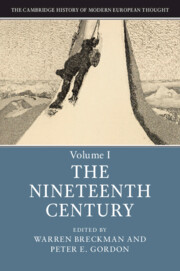Book contents
- The Cambridge History of Modern European Thought
- The Cambridge History of Modern European Thought
- The Cambridge History of Modern European Thought
- Copyright page
- Contents
- Contributors
- Preface
- Introduction
- 1 German Idealism: The Thought of Modernity
- 2 European Romanticism: Ambivalent Responses to the Sense of a New Epoch
- 3 History, Tradition, and Skepticism: The Patterns of Nineteenth-Century Theology
- 4 The Young Hegelians: Philosophy as Critical Praxis
- 5 Utilitarianism, God, and Moral Obligation from Locke to Sidgwick
- 6 Capital, Class, and Empire: Nineteenth-Century Political Economy and Its Imaginary
- 7 Positivism in European Intellectual, Political, and Religious Life
- 8 European Liberalism in the Nineteenth Century
- 9 European Socialism from the 1790s to the 1890s
- 10 Conservatism: The Utility of History and the Case against Rationalist Radicalism
- 11 The Woman Question: Liberal and Socialist Critiques of the Status of Women
- 12 Darwinism and Social Darwinism
- 13 Historicism from Ranke to Nietzsche
- 14 Philology, Language, and the Constitution of Meaning and Human Communities
- 15 Decadence and the “Second Modernity”
- 16 Nihilism, Pessimism, and the Conditions of Modernity
- 17 Civilization, Culture, and Race: Anthropology in the Nineteenth Century
- 18 The Varieties of Nationalist Thought
- 19 Ideas of Empire: Civilization, Race, and Global Hierarchy
- 20 Rethinking Revolution: Radicalism at the End of the Long Nineteenth Century
- Index
19 - Ideas of Empire: Civilization, Race, and Global Hierarchy
Published online by Cambridge University Press: 15 August 2019
- The Cambridge History of Modern European Thought
- The Cambridge History of Modern European Thought
- The Cambridge History of Modern European Thought
- Copyright page
- Contents
- Contributors
- Preface
- Introduction
- 1 German Idealism: The Thought of Modernity
- 2 European Romanticism: Ambivalent Responses to the Sense of a New Epoch
- 3 History, Tradition, and Skepticism: The Patterns of Nineteenth-Century Theology
- 4 The Young Hegelians: Philosophy as Critical Praxis
- 5 Utilitarianism, God, and Moral Obligation from Locke to Sidgwick
- 6 Capital, Class, and Empire: Nineteenth-Century Political Economy and Its Imaginary
- 7 Positivism in European Intellectual, Political, and Religious Life
- 8 European Liberalism in the Nineteenth Century
- 9 European Socialism from the 1790s to the 1890s
- 10 Conservatism: The Utility of History and the Case against Rationalist Radicalism
- 11 The Woman Question: Liberal and Socialist Critiques of the Status of Women
- 12 Darwinism and Social Darwinism
- 13 Historicism from Ranke to Nietzsche
- 14 Philology, Language, and the Constitution of Meaning and Human Communities
- 15 Decadence and the “Second Modernity”
- 16 Nihilism, Pessimism, and the Conditions of Modernity
- 17 Civilization, Culture, and Race: Anthropology in the Nineteenth Century
- 18 The Varieties of Nationalist Thought
- 19 Ideas of Empire: Civilization, Race, and Global Hierarchy
- 20 Rethinking Revolution: Radicalism at the End of the Long Nineteenth Century
- Index
Summary
The nineteenth century saw the rise of global imperial political structures and the advent of industrial capitalism, with its hierarchically structured global economy. European political control expanded from roughly a third of the earth’s territory in 1815 to 85 percent in 1914. An economic “great divergence” between the economies of Europe and Asia, which had been comparable in their most advanced regions in the eighteenth century, opened in part thanks to European conquest of agricultural land in the new world and the forced deindustrialization of colonies such as India. European observers interpreted these changes as evidence of European superiority, and the admiration for non-European civilizations that had been comparatively common among eighteenth-century thinkers all but disappeared. Discourses of civilization and barbarism, progress and backwardness, played a newly central role in conceptions of human society, which varied from universalist theories in which all societies were considered as progressing in similar fashion, if at different paces, along a spectrum from less to more advanced social and political organization, to accounts, often racialized, that held modern civilization to be uniquely available to Europe. Views of empire varied accordingly, from projects of a civilizing imperial mission or of the global spread of European civilization through settler colonies, to defenses of imperial rule on the grounds that non-European societies were not, and might never be, capable of self-rule. Many critics of empire likewise presumed the superiority of European civilization.
- Type
- Chapter
- Information
- The Cambridge History of Modern European Thought , pp. 447 - 469Publisher: Cambridge University PressPrint publication year: 2019
- 5
- Cited by

